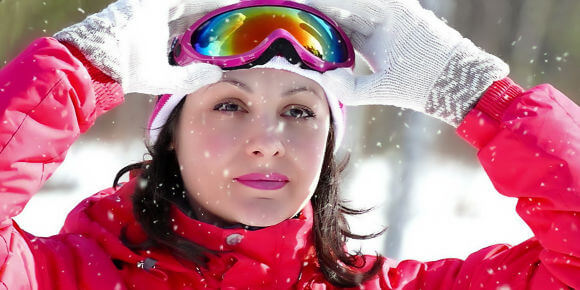
We all know how important sun protection has become. It always was important – we just didn’t know that sunburn is a really bad thing and can lead to skin cancers!
It’s really easy though to think about protecting your skin when you’re on a sunny beach. It’s not so easy to keep this in mind when you’re surrounded by snow. For obvious reasons. You really must however protect your skin when skiing. Seeing snow makes us think cold, and we don’t associate cold with sunburn. Even if we feel quite warm and the sun is beating down on our face – seeing snow messes up our thinking.
Don’t let it.
It’s not the only problem when skiing either. The altitude that comes with ski resorts means dry air, and drier air can play havoc with the moisture levels in your skin. Then there’s the wind on top of that. You’re up a mountain, potentially skiing down it at great speed – that much wind on your face is going to dry out your skin in no time at all.
So here’s 4 quick tips:-
1. Sun Screen
Pretty obvious. Use it, every single day. Carry it with you, and reapply it regularly. Particularly to your face which is going to be most exposed. Don’t forget your hands though if you’re not wearing gloves.
2. Swap Day Cream For Climate Cream
The normal kind of moisturizing day creams that most women use are not ideal at altitude, because they contain too much water (yes, that mysterious ingredient they put on the label as ‘aqua’ that forms the largest percentage of most expensive creams!). You really should be using something with a higher content of fatty oils instead of the water. This will do far more to protect your skin from the dry air and the wind chaffing. That high water content can freeze in the cold air and do more damage to your skin than good.
This kind of cream can be a bit of a problem if you suffer acne though. Normally you’d choose a noncomedogenic moisturizer (i.e. non-pore blocking), but we’re trying to give your skin extra protection here with heavier creams. One thing you can try is the approach Acne System Reviews recommends. This type of more holistic approach can and often does really work. You’ll also need to be careful with any acne treatment creams you are using as these can dry skin further or make them more sensitive to sunlight. Whatever you do, talk to your dermatologist about this well before travelling to get the best personal advice.
3. After Care Is Important
At the end of the day, don’t just forget all about your skin. Apply a good generous helping of a typical after-sun lotion. This will help prevent dehydration and give your skin a chance to repair overnight. Before you assault it all over again on the slopes the next day :-). Oh, and drink plenty of water. Apres-ski does tend to involve a few drinks which is fine, but don’t forget the alcohol dehydrates your body. Your skin is going to really feel that, so take care to keep hydrated.
4. Smell OK, Not Great
Nobody tells you this, but don’t put anything else on your skin. The chemicals and in particular alcohol in perfurmes, aftershaves and fragrances will not do your skin any favors at all. They can also interact badly with your protection creams so ideally don’t use them at all. If you really must, carefully spray away from you only onto your clothes before you put them on.
Dermatologists strongly recommend that you protect your skin and take skin care while skiing seriously. Women get this more than men – but guys, seriously, even James Bond would be protecting his skin from the elements these days. So don’t get all macho and say this is not for you. It applies to everybody.
Stick with these tips and they should help to protect your skin when skiing. Meaning you should come back from your skiing holidays with a healthy glowing complexion – instead of that reddened, dried out flaky look that isn’t quite so attractive.